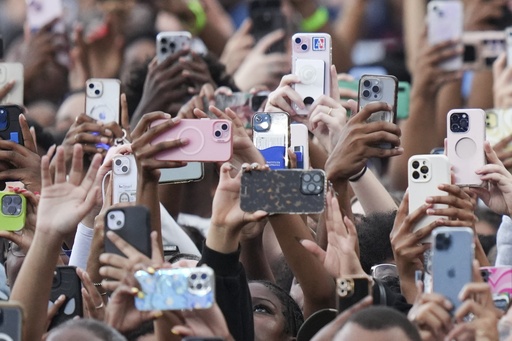A recent report from the Pew Research Center reveals that approximately 20% of the American population, including similar proportions of both Republicans and Democrats, are consistently obtaining news from digital influencers on the social media platform X. This information is based on a survey involving over 10,000 U.S. adults and an analysis of social media posts made by influencers during the summer, highlighting news consumption trends during the peak of the U.S. presidential campaign that concluded with Donald Trump’s victory.
The study focused on accounts maintained by individuals who actively discuss current affairs, utilizing various formats such as podcasts and newsletters, while boasting over 100,000 followers across popular platforms like Facebook, Instagram, YouTube, X, and TikTok. These influencers span a wide political landscape, featuring progressive figures like Brian Tyler Cohen and conservative voices such as Ben Shapiro, alongside non-partisan content creators like Chris Cillizza, a former CNN analyst who has transitioned to running his own newsletter.
The findings indicate that a significant portion of content shared by these news influencers centers on political topics and the election, followed by social issues including race and abortion, as well as international matters like the conflict between Israel and Hamas. The majority of these influencers, around 63%, are male, and a substantial 77% have no ties to any media organization. Notably, about half of the influencers surveyed did not convey any discernible political bias, while a larger percentage identifying as conservative compared to those identifying as liberal.
As the campaign unfolded, both political parties sought to engage influencers, even reaching out to those whose content is not overtly political, in an effort to connect with voters increasingly reliant on alternative news sources. The Republican and Democratic national conventions acknowledged influencers, granting them credentials to report on their events this past summer. Vice President Kamala Harris engaged in discussions on her “Call Her Daddy” podcast, while Trump targeted younger male voters through appearances on shows like “Bussin’ With the Boys” and “Flagrant” as well as a notable feature with Joe Rogan.
Galen Stocking, a senior computational social scientist at the Pew Research Center, emphasized the significance of understanding the individuals behind some of the leading non-media accounts amid the election frenzy. “These influencers have really reached new levels of attention and prominence this year amid the presidential election,” he remarked.
The study notes that while 85% of influencers maintain a presence on X, many also engage audiences on other platforms such as Facebook, Instagram, YouTube, and TikTok. Pew’s research indicates that racial minorities, younger adults, and those with lower income levels are more inclined to receive news from these digital influencers. A majority of respondents expressed that influencers have enhanced their understanding of current events, although around 25% felt that the content they received had little impact. Moreover, 9% reported that influencers have increased their confusion regarding news topics.
Concerns have emerged among media analysts regarding the potential for misinformation stemming from influencers, as most do not adhere to strict editorial guidelines. Nonetheless, some influencers have carved out space as voices presenting underrepresented perspectives. Pew reported that 70% of survey participants perceive news obtained from influencers as distinctly different compared to traditional news sources, with a quarter categorizing it as “extremely or very different.”
Interestingly, the report reveals that TikTok stands out among major social platforms, being the only site where right-leaning influencers do not dominate those identifying as more liberal. News influencers on TikTok tend to show significant support for LGBTQ+ rights and are more likely to identify as part of the LGBTQ+ community, giving the platform the smallest gender disparity among influencers.
